#but also literally at its core it's queer.
Text
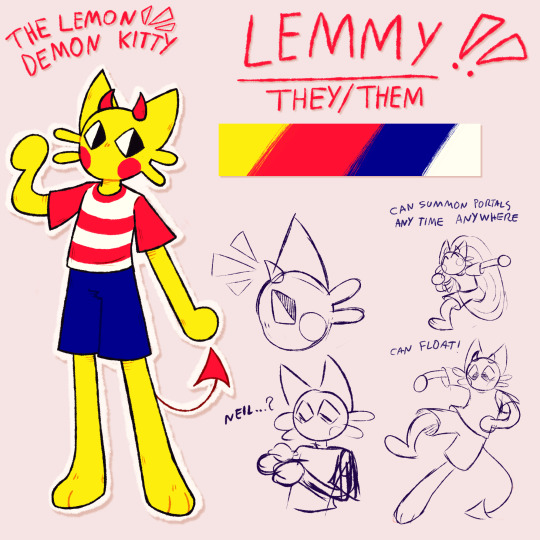
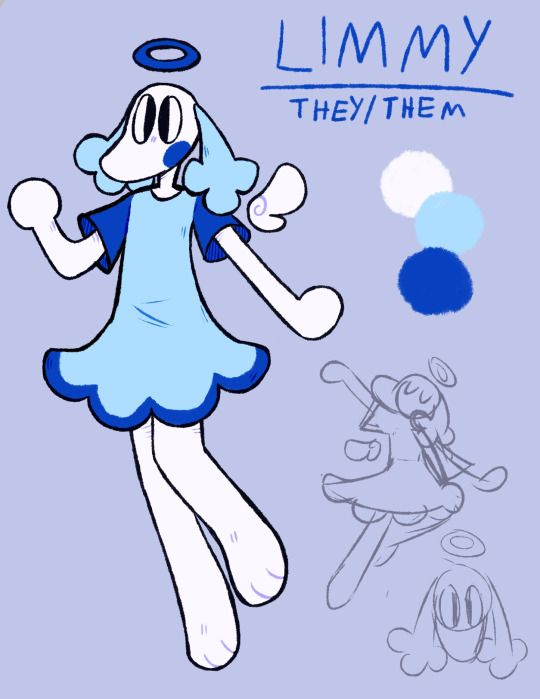
A new ref for Lemmy, and an official design and introduction of Limmy in This Universe Has Lemons In It! Limmy was created by the Guardian of the Lemonverse (any pronouns) as an attempt to stop Lemmy from what they are doing, which is creating portals to travel through various universes and dimensions to have fun. Not only is that a risk for the balance of the universe, but GotL just dislikes this kid having fun and wants to see them stopped.
Not wanting to do it in it's own hands, it created Limmy, an angel dog meant to be an direct opposite to Lemmy. Limmy, however, doesn't do much to stop Lemmy, other than following them and bickering. Their relationship is very Tom and Jerry rivalry-esk.
(Names color coded for myself to read easier due to the similar names!)
Fun fact, Limmy was originally going to be based on limes (Lime Angel), but I kept that concept for GotL - and made them more angel-like instead.
#GotL as he has been named for the time being uses any pronouns but it/he are the most used just saying#also this little story/oc universe has been planned for a while so i find it funny that GotL has basically the same motivations#miguel in across the spiderverse minus the trauma and more godly power#i just always had an fascination with like...the idea of the universe...multiverses...different dimensions and traveling across them#ive included this in most if not all my oc projects like this actually! at first mostly inspired by gravity falls#which is literally my favorite cartoon ever#i am watching a 2 and a half long video on the timeline rn its so good please watch it its by hana hyperfixates. while working on this i#watched their first 2 hour long gravity falls video. literally newest favorite video essay project? its very good it talks about queerness#in gravity falls and its their passion project and its so obvious there was a lot of effort put into it. anyways away from my tangent i go#'lemmy' put my actual tags here#oc art#character design#oc ref#ref#tuhlii#this universe has lemons in it#lemon demon#UNSURE again if i wanna use '-core' tags on this. i dont like using them much anymore and im only gonna use 'weirdcore' for some kind of#music bc theres no specifics to what type of music i exactly like that lemmy is also based on aside from lemon demon of course#[Lemmy]#[Limmy]#guz art#[2023]#fun fact! i spent like 20+ or so minutes stressing over GotL's possible name until i settled on this goofy title!#its meant to found goofy. like at first you think its gonna sound cool and then youre hit with 'lemonverse'#which it...technically is! where lemmy is from it's like... a connected bunch of worlds and universes and just places all based on#lemon demon songs and other content. tuhlii is basically a love letter to ena + lemon demon + old/childhood internet ?
70 notes
·
View notes
Text
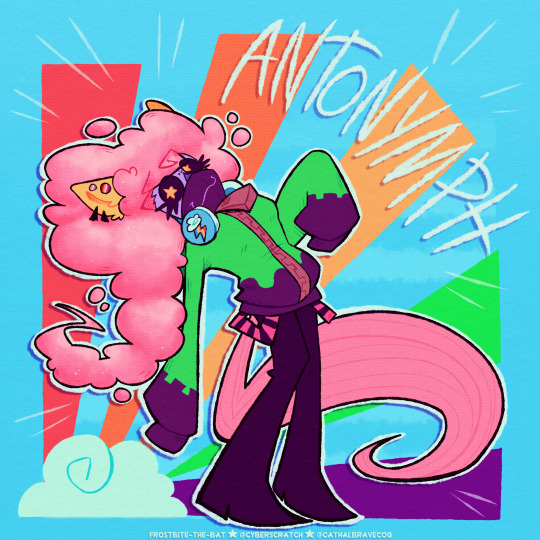
i'm the antonymph of the internet
#how many tributes to this song will i make in my life#MANY ! it literally changed my life and means a lot to me. i love antonymph and vylet pony's music is worth checking out - please do.#unsupervised internet access as a queer neurodivergent kid anthem !!#i chose to do misty since we all know i like drawing her in experimental pieces and putting her in outfits. she also has art in a gir hoodi#from the clash team in treasure trove!! :D#this is also experimental/stylistic as well!! had fun!! nice to just draw something in one day and not worry. leaves me tired but...#haven't done a nice piece like so in one day in a while!!! i'm very proud :] it's a fun one#anyways... both a little tribute to the song and misty as a character#ihave so many thoughts about misty even if i dont talk publicly on them. shes a very interesting character to me and i care about her so#much. i compared her to fluttershy in the past - and realized that if i liked ttcc as a kid she would've been my favorite.#fluttershy on her own meant a lot to me as a child. including mlp itself as it's one of the core things that got me into drawing art online#a lot of my analysis on misty and headcanons at least on the more emotional scale do come from a bit of projecting but...it makes it more#fun to me when i can put myself into the shoes of a character like her who i already relate to. rrghh too bad im scared to talk about her#too much in nuanced detail in public since some people are... not so nice about her. though i know the tumblr audience is nice and unders#standing!!#anyways from me just having fun being me#i let misty have a little bit of fun... something i think she would possibly enjoy? i do see her as someone who gets nostalgic#and is stuck in more childish things and matters. she wants to play ip dip with you...its very sweet to me. letting myself and her be#confident through a song that means so much to me is kind of powerful to me. i had a lot of fun making this drawing.#anyways. love this song. love ttcc. love mity /p. be swag and be self indulgent and have fun. you can do anything u want forevah#toontown#toontown corporate clash#antonymph#guz art#rainmaker
53 notes
·
View notes
Text
ive seen more posts bitching about people who say 'i hate men' than actually saying it. i mean this kindly bc im men but get over yrselves 💀💀
#ITS SUCH A NON ISSUE ITS NOT EVEN FUNNY#thinking that 'men are trash' is a core tenet of gender essentialism#or worse terf ideology#is so out of touchhh#'what about men of color or disabled men or queer men'#well if they want to join in they could have just asked! 'i hate white/abled/cishet people' is right there <3#its not a fucking political sentiment that women are fighting to the death about#literally the exact same seriousness as 'i hate anime fans' or something#sure this *could* reflect racist assumptions about japanese media#or it could be about their dick roommate who bought figures but didnt contribute to rent#ultimately you dont know and if i started playing the victim card about this#(and harassing women in the process as many men are doing rn 🫣)#id be fucking weird lmao#also terf ideology is not about 'i hate men' their primary target has always been trans women.
6 notes
·
View notes
Text
Like a whole other thing is when I have put Mani/Moe in situations where suicide as a topic is part of the punchline, I am so cautious about it, and there's always a greater intention behind it. Biggest thing is the characterization -- this is a part of its history. Moe's experiences inform a lot of its feelings, choices, even core personality. It's also a distinct characterization of Mani. A reflection of the past. Mani is more prone to becoming volatile and destructive. I have so much lore in my head I can never elaborate on LMFAOOO (SCRAMBLED. EGG). But that is the point/idea behind it, and I am always So Careful. I don't do anything without intent.
#suicide ment#moe tag#mani tag#something something moe is a healer. bc ofc it fucking is LMFAOO#i feel like. i have so many thoughts. but i cannot fucking articulate them LMFAOO#idk moe is like a rescue animal.#LIKE. I FEEL LIKE A CORE PART OF MOE AS A CHARACTER. is the fact that it's doing better now#but it never fully 'recovered'.#it still has mental health struggles/conditions. but it's well-managed and at this point moe is more practically minded about it.#like maybe an even bigger part of moe's entire fucking character. is that you can't 'fix' it.#one bc some things were never meant to be fixed. an impossible task that led to nothing but trauma.#examples would be its gender identity/queerness in general and being autistic. those are things you can't 'fix'#and things that. never should be 'fixed'. bc they are literally not problems.#two. idk how to word it. but some things can't really be fixed but in a different way than the prev example.#but you manage the symptoms of it. change harmful behavior. practice damage reduction as much as you can.#already i am so tired and i'm gonna thrup trying to explain the difference. but please i am begging you. there is one. just trust me.#like having self-harming tendencies deeply ingrained in you is wholly different. i wish i had the fucking words to explain it.#but that IS. a core aspect of moe. capturing how these things have impacted it#and also. having gotten to a point where it stays silly.
3 notes
·
View notes
Text
Kendrick doesn't just hate Drake as a person. He hates the very idea of Drake.
Hip-Hop is rooted in revolution. In defiance. These are the songs of an oppressed group of people, and decades upon decades people have hated it. Accused of being meaningless and invalid. Media outlets took steps to belittle hip-hop and make sure it isn't recognized as an art form and as a means to fight back.
2Pac spoke of wealth disparity and inequality. Tupac was literally a member of a communist organization when he was younger and never stopped speaking against capitalism.
Lauryn Hill spoke of the struggles a woman faces. Not just women, but black women. Salt-N-Peppa. Queen Latifah. MISSY FUCKING ELLIOT.
N.W.A made sure people knew about police brutality and violence against the Black community.
And now, in this day and age, we're also experiencing an explosion of Queer Hip-Hop. Lil Nas X is at the forefront of this. Lil Uzi Vert came out as non-binary and uses they/them pronouns, even when they knew that a lot of their fans would never use it or even respect them for it. Auntie Diaries, a song about a young man who grew up in a transphobic environment and bought into those beliefs, but could never fully do it because his Uncle loved him so much and taught him a lot of life lessons, and that wisdom translated to him accepting his cousin as a woman as well.
Drake is none of that.
He's the perfect representation of what people think hip-hop is. Flexing. Posturing. Objectifying women. A fucker so insecure he bought 2Pac's ring just to feel like he's part of the black community. Rejected by Rihanna publicly. Tried to groom Millie Bobby Brown. Kissed and inappropriately touched an underage girl during his concert. His songs have inspired so many young boys to treat girls like shit. His belief that the amount of rings and chains and cars he has is the true meaning of success.
Additional Edit: This is my fault. If this post gains more views, then it would be remiss of me not to add to this. It was my fault to begin with, not stating this beforehand because while I did know, I got lost in celebrating Hip-Hop in a place that doesn't usually do so, and rightfully so.
2Pac did fight for wealth equality and better social living for the black community. He also has a long, long history of battery, domestic abuse, and sexual harassment against women. Specifically against women of color. He made a song to celebrate his own mother, but outright refused to give the same show of respect to other women in his life. His hypocritical nature was brushed off in later decades, just the way I did now.
N.W.A is the same. Sexual assault charges, violence—they spoke of Police reform, but refuses to give the same treatment back towards the women in their lives.
50 cent refuses to backtrack on any of his misogynistic lyrics.
Modern rappers of today, such as the dead XXXtentacion. 6ix9ine. Kodak Black.
I do love Hip-Hop. I love rap. And the music itself has always been anti-authoritarian at its core, because those are its roots. And I was happy that circles that did not normally know of it or enjoy it were getting into it, even for one thing like this rap feud.
Lil Nas X, Little Simz, Childish Gambino, Missy Elliot, Queen Latifah, Lauryn Hill—rappers who have at the very least consistently tried to put their money where their mouth is. Who have tried to act in accordance to what they rap and write and sing for.
@shehungthemoon @ohsugarsims finnthehumanmp3 were the ones who rightfully clarified in the comments. I know an apology won't correct my hypocrisy or my stupidity. I should have added all of this before making this post, but I wanted so badly to celebrate a genre of music but failed to do my due diligence in showing a better, holistic view of it. If anyone felt triggered, offended, troubled, frustrated or any other intense negative emotions surrounding this, please do block me. I'm sorry.
9K notes
·
View notes
Note
What's you take on the whole wand situation?
It never ceases to amaze me how well Draco's wand worked for Harry when he had trouble with Hermione's wand and they've known each other for years.
Not only did the wand work, he also defeated Voldemort with each I find so funny for some reason.
And we need to remember that his wand was made of unicorn hair, which makes it extremely loyal to its owner so how the heck did it work well enough to defeat one of the greatest wizards of all time?
J.K.R can claim that Harry disarmed Draco all she wants, I call bullshit. To me it feels they share a deep connection which is why it worked
I KNOW!! It is insane that JKR, Queen of the Anti-Drarry Squad, wrote this in canon. So fitting that she should be cursed to accidentally canonize queer ships she hates lol.
The bit about Hermione's wand is super interesting for several reasons. Harry never wins the wand from her, but because they are very close and compatible and because she loves Harry and wants the wand to work for him, it does. Not perfectly. But way better than the Blackthorn Wand, which he didn't win AND which came from a stranger who had no compatibility with him and felt no allegiance or emotional connection to him. So we see that the compatibility of the wand's owner with someone and, crucially, the emotional bond they have with you, also influences how their wand responds to you.
This has huge implications when it comes to Draco's wand. Draco's wand is made of unicorn hair, which, as you correctly point out is known for its loyalty and affinity for its original master. This is not a fickle wandcore that is easy to just win in a quick duel. Not only that, but hawthorn wands are particularly tricky to master.
Plus, if wands could switch allegiance too easily then it would've come up earlier. If just disarming someone is usually enough to do it then any class where such things are practiced would have huge repercussions. Not to mentions fights between enemies. It would be a huge problem for Death Eaters or Aurors. Snape would've lost mastery pf his wand to the Marauders pretty early on in his school career. (Harry also would've lost mastery of HIS wand to Snape in the end of book 6.) This would make wizards extremely cautious about dueling each other. Thus, the character and desires of the wizards and of the wands and the specific circumstances must play a much bigger role. Some wands must be more loyal than others too. For example I can imagine the Elder Wand being relatively fickle. Or the kind of wand that would choose Peter for example. But a unicorn hair wand?
Furthermore, Harry doesn't even really fight Draco. He pulls the wand right out of Draco's hand. And Draco...lets him. He has fast reflexes. He's a Seeker who is nearly equal to Harry in ability. And we see how quick he is at spells and how well he holds his own against Harry during their duel in book 6. Yes Harry - who is a deadly dueler - beats him in the end, but they go several rounds. Draco, in fact, holds his own against Harry for longer than anyone except for Snape. Much longer than Voldemort ever does for example. So if Draco had wanted to get off a spell to blast Harry away from him when Harry was totally unarmed and literally just trying to pull the wand out of his hand - he could have. But he doesn't. He lets Harry take the wand.
And the wand's loyalty transfers seamlessly to Harry. Not only does it work for him. It works PERFECTLY. It feels "friendly" in his hand. In a way even Hermione's didn't. He is deeply compatible with the wand and the wand obviously is actively friendly to him. This clearly reflects Harry's fundamental core compatibility with Draco (they're soulmates your honor!) and also Draco's true loyalty and affection towards Harry.
The Hawthorn Wand isn't betraying its former master. It's honoring his wishes by protecting the man he loves.
#asks#drarry#drarry in canon#hpdm#dmhp#harco#drarry meta#my meta#meta#Harry Potter#Draco Malfoy#wandlore
137 notes
·
View notes
Text
The fact that I’ve seen a few people try to analyze I Saw the TV Glow through a lens of it being about like, fandom and obsession with media and nostalgia being bad ?? is genuinely blowing my mind. Obviously there’s the fact that this movie is as unambiguously about being trans as it can possibly be without just saying outright “this is a movie about being trans” but I also think this is crazy because I would say it actually has one of the most unambiguously positive relationships with concepts like “media consumption” and “nostalgia” that I’ve seen in a movie.
Like, to say it’s a shallow interpretation of the film to call it “about media/fandom” (and especially a negative depiction of such things!) is putting it quite kindly because I kind of feel that anyone who utters such sentiments didn’t actually understand the core element of the entire movie: “The Pink Opaque” is not a show. Commentary the film makes about watching “The Pink Opaque” cannot translate to commentary on watching shows broadly because the movie spends half its runtime making it explicitly clear that “The Pink Opaque” may be a show that exists in a literal sense but is not one in a figurative sense. “The Pink Opaque” represents the possibilities of childhood and innocence. Innocence that still is not free from judgment—Owen gets told the show is for girls, Maddy’s friend accuses her of sexual harassment on account of her sexuality while they were watching it together—but it’s the moment in your youth (or any time! it doesn’t have to go away!) when the possibility of queerness and more explicitly queer utopia feels real to you. The external pressures to conform are still there but you can tune them out if just for a moment to envision a future and a life for yourself free of it and living authentically. I think this is an experience all LGBT people can relate to, but in the case of ISTTVG it’s very explicitly primarily focusing on queer femininity, predominantly transfemininity, but in Maddy’s case as well she is a queer woman (I’ve seen some interpretations of her as transmasculine but I disagree personally). Hence the on-the-nose nature of it being PINK.
What feels very genius about Schoenbrun making it about a show though is that it’s so generational, right? For all of us LGBT people who grew up in the age of screens that WAS where a lot of that early imagination going wild resided. The first time you explore a new name is on anonymous forums. The first time you explore your masculinity or femininity is with which character you relate to in a show, or which gender you select in Pokémon. Movies and shows with “queer subtext” or even without give young LGBT people the chance to envision relationships and futures for themselves, what many grow up and call “shipping.” You have your first gay crush while watching your favorite movies. You envy those of your true gender while watching your favorite movies. Amongst many other things when Maddy watches “The Pink Opaque” she’s given access to a world where two women share this intimate connection and overcome obstacles together. When Owen watches “The Pink Opaque” they’re given access to a world where femininity is a real option for their future.
The relationship these characters have to “The Pink Opaque” is a net positive and the movie makes that so incredibly obvious when Owen goes back to rewatch it later and finds that it’s nothing like how they remembered, it feels childish and immature and dumb. That is a bad thing. This is a bad thing. The movie wants you to see this as a bad thing. This is the result of repression, of conversion therapy, of violent coercion into normative lifestyle—That sense of limitless possibility is destroyed and the idea of accessing one’s transness, of imagining this utopia where you CAN be yourself and live as a woman, strong and beautiful on the other side of the screen as said in the film, is lost. Now you tell yourself it feels silly, it feels childish to imagine such things, it’s not nearly as deep and meaningful as you believed it was when you were younger and less inhibited, or it’s at the very least easier to tell yourself that. Owen’s feeling embarrassed is of note here. If it weren’t for these external pressures that have been internalized they very well may have been able to still enjoy the show, even as they’ve aged and grown and matured, even if their perspective has changed a little. But they can’t. Not yet, at least.
I feel kind of out of my mind seeing people try to approach it through a lens of commentating on media consumption because it’s so deeply missing the layers of what’s actually being said… and not even in a wildly obfuscated way. The movie is ABOUT the relationship these characters have to “The Pink Opaque” and how the loss of that is a bad thing. How you can possibly watch it and see it being about some kind of growth from obsessive media consumption is mind boggling to me. Seeing multiple reviews and posts in tags about it is crazy. One thing I really like about this movie is that it so confidently argues for a more positive interpretation of being obsessed with “fantasy” and the childlike wonder of the limitless possibilities of fiction. I think that’s a very very trans narrative, as I mentioned it feels tied deeply into Queer Utopia, and I find it much more bold of a stance to take. In a world where people tell trans individuals (and especially trans women) that their identities are works of fiction or products of the imagination or even caused by excessive media consumption, to embrace these things and turn them over and use them as a symbol of the whimsy and innocence and excitement that first ignites that spark as a positive, thrilling, beautiful thing is very cool.
177 notes
·
View notes
Text
can non intersex trans people please stop putting intersexism and bio essentialism shit on my dash like??? all the time???
whenever i try to talk about nuance in transphobia and point out blatant intersexism i am simultaneously made out to be a stupid naive little bitch woman who doesnt know what shes talking about and an evil misogynistic man when i am neither. its textbook erasure and dehumanization no matter how polite and understanding i try to be. and i am talking SPECIFICALLY about trans people. often because perisex trans people are WORSE at recognizing and correcting their intersexism because they view themselves as "above" bioessentialism for their transness,,, its honestly tiring
the way sexism presents is the fundamental idea that :
women by default have LESS agency
and men by default have MORE agency
i feel like i shouldnt have to tell you that this is dehumanization of BOTH, but ill do it anyway. someones agency in a given situation depends on a VARIETY of different factors, like class / race / disability / location / & the political views of the community they are in
moreover "man" and "woman" are not actually defined terms. for example, being a victim of misogyny has ZERO correlation to whether or not you are a woman, in BOTH ways that people categorize womanhood. either as a biological trait (or a collection of traits) or as an identity label
if you get catcalled on the street that is not because you ARE a woman but because you are PERCEIVED AS ONE by the catcaller. someones profiling of you as a woman being accurate DOESNT MEAN IT ISNT PROFILING. literally NOBODY has a chromosome detector 3000.
so many forms of gender based discrimination perpetrated in the queer community COMPLETELY skip over these nuances in discrimination and often get EXTREMELY ANGRY when you try to point them out! this is often because people have this inherent belief that they are somehow transcendent and that they DO magically have a chromosome detector 3000, that their profiling is magically always correct, and this belief is tied to their ego.
moreover people mischaracterize sexism as just "hating women" and NOT actually as "sorting people arbitrarily into boxes for their perceived genders", if you are a TERF you are EXACTLY THE SAME AMOUNT OF SEXIST as someone who believes women shouldnt be allowed to vote. they still hold the fundamental idea of men by default having more agency.
i think TERFism is a wonderful example of how people can be sexist against men and the harm that it causes, because that is the ideological core of radfem politics.
people perceived as "male" when placed in a community full of people seen as "female" are automatically seen as predatory for their perceived privilege (regardless of if those privileges actually apply in that setting at all! look at transfemmes! they get literally zero benefits from their perceived manhood, and yet are still seen as predatory because of it ). when i speak about "misandry" however loaded the word is- this is what i am referring to, the assumptions and discrimination that comes from being arbitrarily placed in a gender category seen as having universally more agency.
because agency isnt innate or biological this sorting into categories is ALWAYS sexism even if they benefit the person!!
this is why i think phrases like "TME" are inherently harmful, because weather or not someone is seen as a "man" or a "woman" is completely arbitrary and can differ wildly depending on not only the person doing the profiling, but also the context of the situation. trans-misogyny, being seen as a "man" trying to "invade" a "womans space" is not exclusive to transfemmes nor even universally applies TO transfemmes.
moreover its why i hate the word "trans-androphobia" because its not even descriptive of the perception of being a "girl" trying to be a "man"
i think in general the shorthand the trans community uses lacks so much fucking nuance and is baked in with intersexism and bio essentialism pretty much as a rule.. i think it's infinitely more clear to use words corresponding to what exactly the profiling of whoever is being bigoted is far more helpful and clear, but in order for something like that to be clear it needs to actually be used with nuance and keeping in mind the fact that discrimination is based on PROFILING and not off of any kind of objective reality. In which words that just mean "the type of discrimination transmen go through" is ambiguous and unhelpful on every level.
if you wanna be less intersexist YOU NEED TO LET GO of the idea that certain people universally have more/less agency AS WELL AS THE IDEA that you are universally exempt from or included in any kind of gender based discrimination
#the beast speaks#retchid opinions#bleughhghghg#i hate how i can be so niceys about things and then i have people with no reading comprehension call me a stupid bitch#often times other trans people even.. people get mysogenistic so fast u have no idea
108 notes
·
View notes
Text
The Beast & The Church in 'Black Death Rising'
I'm writing a religious horror rpg, in which the End Of Days is in full swing in 15th century Europe. I figured it'd be worth it to talk about that game's religious perspective.
So I'm going to do something inadvisable, and talk about religion from a christian perspective.
(religious/setting design ramblings under the cut)
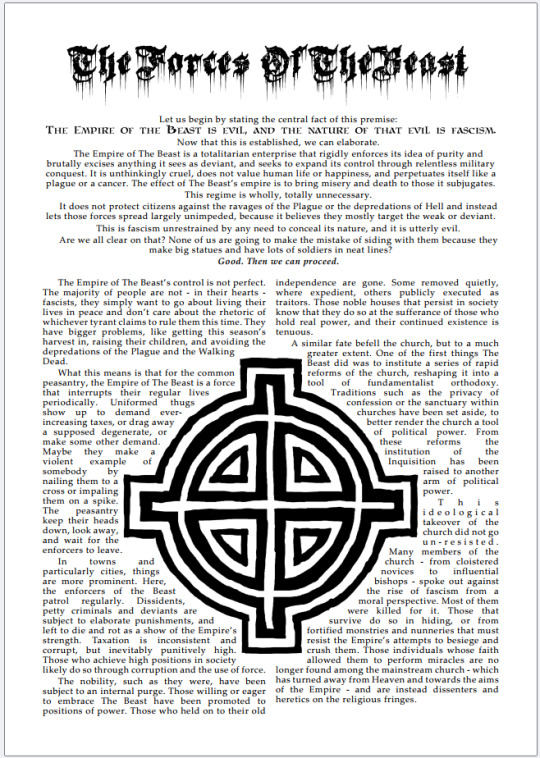
Some context. I'm a quaker; for those less invested in minor christian dissenter sects, I'll give a brief summary. Quakers are a sect going back to the 17th century, with a strong focus on egaletarianism and individual conscience. No clergy or heirarchy, no formalised doctrines, and - historically and currently - a lot of focus on social justice issues. Honesty, equality, pacifism and simplicity as core value. So that's the overview.
This is, you will note, a stark contrast to a lot of what Christianity is currently, and has historically been. Which is to say, quite often on the side of the wealthy, the societally entrenched, and the oppressive.
I am also, as it happens, very openly and obviously queer. As you can imagine, this makes me really quite uncomfortable in a lot of 'christian spaces'.
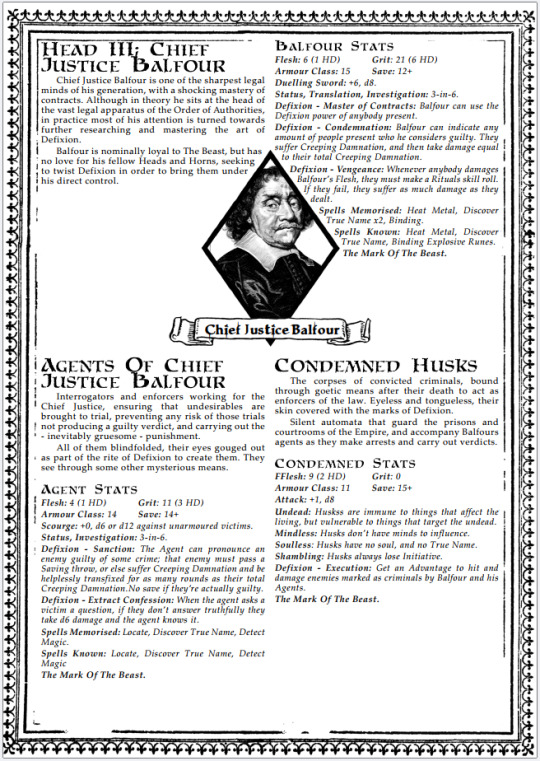
So. Let's turn our attention to the Book of Revelations, as the various ideas in there are a lot of the game's inspiration. Revelations is written extremely abstractly, with dense metaphorical language rather than a direct accounting of events. There are, needless to say, a wide variety of ways to interpret the text, but I will focus on my own.
A key feature of Revelations is the subversion of religion; the idea of a false prophet turning religion away from its moral/spiritual purpose, and making it a tool for politics, leading to the rise of 'the beast' to power. It's made clear that as the beast seizes power, it goes on to use that power to persecute the outgroup (with whom the text's sympathies lie) and that a church controlled by and reverent of the beast becomes evil and totalitarian, leading to widespread suffering.
The parallels to the state of christianity in the modern day are, to my mind, quite apt. A wide faction - 'conservative christianity' to be polite about it, or christian nationalism to be more blunt - aligns itself with the oppresser over the oppressed, concerns itself with worldly wealth and power, and is actively and openly and inexorably tied to dangerous political forces. That mainstream christianity frequently acts in support of fascism is hard to miss.

There is a particular horror, I think, to seeing representations of one's faith hollowed out and distorted, emptied of their spiritual value and instead becoming a tool for evil. The perversion of what should be sacred has a huge potential for horror.
This is, after all, a particular horror one encounters in a regular basis in the real world. I mean, fuck, one simply needs to see Kenneth Copeland speak for 30 seconds to get a sense of something deeply, deeply wrong.
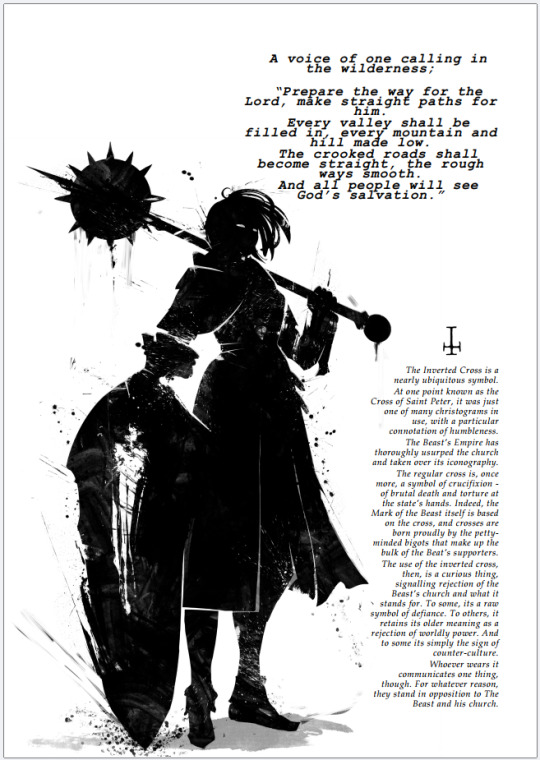
So, this is the horror the game seeks to capture and accentuate. The sense of what should be holy having been emptied out and used for evil. The twisting of faith to become a tool for fascism.
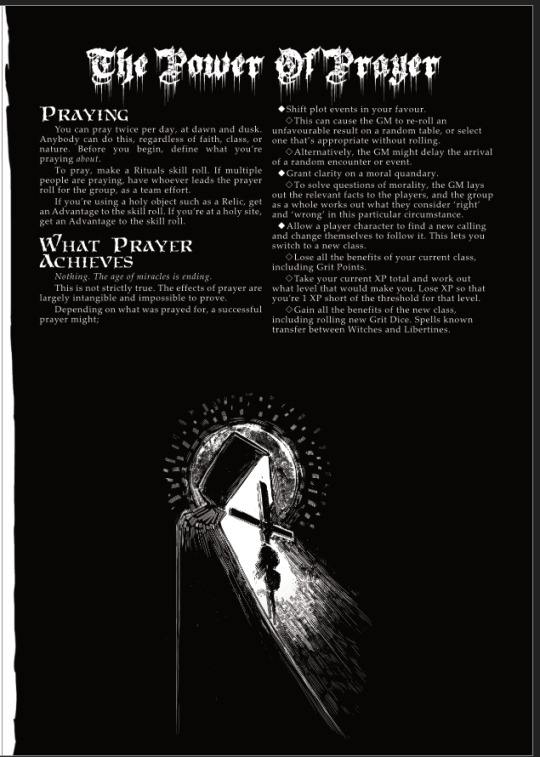
To this end, the game treats aspects of Revelations quite literally. The Beast is, in fact, the leader of a vast and horrible fascist empire that is the cause of misery on a vast scale. Key to this is the total cooption of the church. The 'pope' is a reanimated corpse issueing proclamations at the Beast's direction, and the church is an engine of propaganda and inquisition that serves to enforce the empire's orthodoxy and stoke hatred against the Empire's outgroups.
This is not to say that faith is absent, but those possessing true spiritual conviction (and with it, in some cases, the ability to perform miracles) are definitively outside the church; actual faith is the domain of religious dissenters and heretics. PC clerics are not members of the church, they're actively persecuted by that church for - essentially - their refusal to spiritually sell out.
(Also, critically, miracles are not the sole domain of christianity; the game treats Jewish and Muslim figures as equally capable of performing miracles, and grants relics associated with those religions equal potency to christian ones; what matters is spiritual conviction, not one's specific denomination).
Other aspects of The Beast's Empire followed from this. Inquisitors and paramilitary agents are common enemies, and the 'seven heads and ten horns' are taken to represent The Beasts inner circle of most powerful servants.
In particular, I've given the Beast's empire it's own form of magic, Defixion, with the name taken from old roman curse-tablets. Defixion is, essentially, the magic of spiritually selling out. In exchange for eroding the user's soul, they become bound to The Beast and his empire; this gives him incredible power over them, but also grants them power based on their position within the Empire's heirarchy. Importantly, it's totally, one-hundred-percent off limits to player characters; playing as the fascists simply exists outside the scope of the game. Instead, Defixion is an explanation for why the Empire's agents have scary monster stat-blocks.
The choice of what to make The Mark Of The Beast was surprisingly easy; it's a cross, the same one that is embraced by fascist groups such as Stormfront.
(This also ties in with the use of the inverted cross as a counter-cultural icon; it's historically been a symbol of humility before God, and in the modern age is associated with strongly anti-church sentiments. In a setting where the church has turned away from God and towards hateful political power, those two meanings can go hand in hand.)
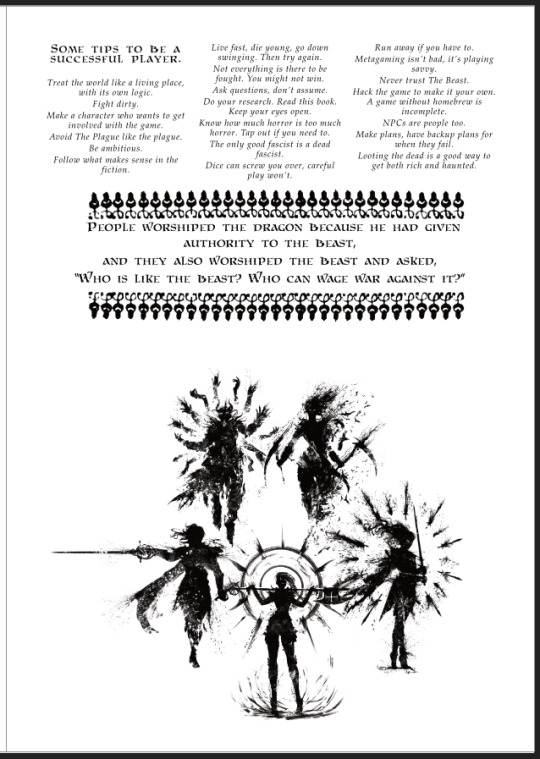
In conclusion: "I know writers who use subtext, and they're all cowards."
74 notes
·
View notes
Text
snw spock rant
i've been watching strange new worlds recently, and the prevailing feeling i always leave with, no matter the episode, is that i would like it if not for spock.
don't get me wrong; i'm a tos fan to my core. star trek launched me into a love of sci-fi and space fiction and is the whole reason i'm in university studying astrophysics, why i'm writing a book using said inner astrophysics nerd, why i have any sense of purpose to me, cliche as it is to say. star trek was an integral, important part of my upbringing, and continues to be one of my main interests to this day. i love jim (and i love snw jim! especially after aos kirk (shudders)) and i love bones (i really hope he joins snw soon....leonard mccoy save us....save us leonard mccoy...) and i love scotty and i love spock. but not snw spock.
here's the thing about spock: his internal character conflicts have always had some sort of root in him being not enough/not vulcan enough/not human enough/etc. his struggles with relationships as a result – because, lets face it, both humans and vulcans are social creatures and need friends otherwise society as a whole wouldn't be a thing on either world – make up a core part of his character. in tos, his relationship struggles were nearly purely platonic, with a few offhand remarks about stray crew members having crushes on him (uhura in early first season, chapel in amok time).
s1e4 "the naked time". spock, right before losing his figurative Marbles, sees "love mankind" written on a wall. later, he goes on to say to jim: "when i feel friendship for you, i'm ashamed." other posts have done and will do better jobs of explaining it, but in conjunction with "sinner" written on the turbolift near jim (about not being able to form lasting relationships with other crewmates because its too much of a power imbalance), the writing on the wall (literally) is that spock is inherently ashamed of his humanity. he has been raised on vulcan to be a vulcan.
his internal conflict is always about him struggling with his human side. he struggles with friendship, he struggles with his humanity, he struggles to be something that people don't immediately deem wrong. as a gay man, and certainly as a young queer child first watching tos, i felt closest to spock not just because of feeling ashamed of part of my cultural heritage, but also because of repression. spock represses these feelings of insecurity, of friendship, of the need for connection in others in a certain way, so much that it causes him pain. growing up gay, his pain was very real to me. writing on the wall. he’s silly and a cool character of course, but he resonated with me in a way that, at the time, i didn’t have anything to resonate with.
what does this all have to do with me hating snw spock so much? i want to preface this by saying i went into snw really wanting to love it. i saw the intro and the planets and the nebulae and the black hole and the music and was like "damn, this is fucking cool." star trek, to some part of me, was also about the space exploration aspect as much as the characters. the whims of wacky crewmembers and sentient rocks. the impossibly infinite things nature can form on its own. snw looked fun. i really wanted to like it. and you know what? i almost like it.
except for spock. quite literally the only character i have any quarrels with is spock. dehydrated, glistening, oiled up spock. wtf. why is he in a relationship with t'pring? why does he (almost) cheat on her with chapel? and why chapel??????????? chapel has a one-sided (VERY CLEARLY ONE SIDED) crush on him in tos. why is it two sided now.
what, and i can't stress this enough, the fuck?
and don't come into my house and tell me "oh you know, it makes sense, because, because then spock gets all hard and Logical and shuts himself off and obviously the reason for that is a breakup–" No!!!!!!!!!!!!!!!! no no no no. i don't care if it makes “sense” it feels so intrinsically wrong to his character. i’ve had much more character development from losing life-long friends than ending barely a year long relationships. spock wouldn’t immediately shut down because he kissed a girl once and then she said “acshually sowwy my work is more important” when that’s the exact sentiment he echoed to t’pring when they broke up.
more importantly, snw spock barely has friends. he calls pike a friend once or twice, but i hardly believe that they're friends. he barely interacts with la'an or erica, he has a few passing conversations with uhura in season 1 on episodes about her that don't really carry into season 2, and otherwise he's just There. he doesn't have friends in snw. the writers are prioritising him having a romantic relationship over a friendship. snw spock needs a friend way more than he needs a bone buddy. and it really rubs me the wrong way the way the relationship with chapel was portrayed to be first friendly and then romantic. i never believed for a second that he and chapel were friends – despite the screenwriters trying. every time they talked prior to s2e5 there was this odd undercurrent of sexuality that seemed to follow them. lingering looks, touching fingertips, long pauses – it was so unbelievably awkward and obvious that they were setting up a relationship between the two. i mean, for fucks sake, s1e1 uhura calls chapel "spock's girlfriend." boy did my blood boil when i figured out that was where the show was going. s1e5 was actually painful for me to get through (chapel sits down, gives spock relationship advice, giggles, smacks him upside the head, and calls him an idiot. 2017 wattpad is calling, they want their material back) and i had to take two full days to get through s2e5 because i was in anguish the whole time. it was a constant mental barrage of "spock wouldn't say that," and "spock wouldn't do that," and "this is not spock."
for the most part, i couldn't figure out why spock and chapel's relationship specifically bothered me so much. i mean i have my quarrels with la'an and jim, and i really don't give much of a care about pike and batel so why was spock and chapel grating on me so badly? was it because it was being shoved in my face? was the writing that much more atrocious than the others? was it the decimation of spock's character?
it was, i found, a product of all of those and the issue of queerness.
look; i've survived sherlock bbc, i’ve survived the golden age of quotev fandom in 2016, i've bared witness to so much queerbaiting in my life that i don't even bother trying to hope for any sort of main character queer representation anymore. we’re going to be a footnote until someone does something about it. unfortunately, that’s not going to be me because i’m not a film director. so i look the other way and steam about it on twitter or tumblr or whatever hoping that i, like many other frustrated queer people, get noticed one day in the far future when it’s ok to have a queer romance in mainstream, it’s ok to have a queer main character, and it’s ok to let it simmer slowly and burn instead of jumping into it to say “look guys we’re woke!!!!!” (star trek literally was the pioneer for most of these things back in the day. but that’s another discussion on the heterosexualisation of progressive media that i wont get into. it just feels bitterly funny that this is happening to star trek of all things.) these days i just pretend the relationships dont exist and skip over them when they happen. i've developed a sixth sense for when weird, forced heterosexuality is about to be shoved down my oesophagus. i've just gotten used to it.
but sphapel (or whatever it's called) burned through me. i've never felt quite this angry at an on screen relationship. and, trust me, i saw AOS. i didn't like spuhura then and i don't like it now but i wasn't angry so much as i was just tired and annoyed. but spock was – and always is to me, confused, queer 10 year old me – a queer character. his struggle with humanity, with friendship, with fitting in, with just being as a perceived "other" was what made him an interesting character to me to begin with. he was a certain outlet to vent that frustration for being "wrong" in society no matter how hard you try to conform one way or another. the knowledge that even if you are different, you still have people backing you up. his fucking friendships, guys. jim and bones. yes i know his friendship with jim is also inherently romantic dont worry im spirk #1 shipper but that’s not relevant here because, and forgive me for being pessimistic, i don’t believe for a second that these writers are going to lean into spirk anytime soon. their relationship went beyond friendship or romance or any of that stuff. coughs in the roddenberry footnote.
what i’m trying to say here, in layman’s terms, is that giving a friendless character a romantic relationship is exactly how you alienate a character. name one person you know in real life that can survive healthily with one single relation, that being their romantic partner that they have no friendly base of. you can’t. that’s a toxic relationship. that’s not romance, that’s alienation. that’s isolation. that’s loneliness. and that’s the OPPOSITE OF WHAT EXPLORING SPOCK’S HUMAN SIDE IS SUPPOSED TO DO TO HIM .
by stripping spock of his friends, and forcing his arc to be purely romantic, you have essentially stripped the character of all he is. i'd be mad if chapel was a dude, too, honestly speaking. but beyond that, corralling spock of all people into a heterosexual romantic relationship is – well. it's a choice i don't think i can ever agree with. the best way i can describe such a choice is like a dissonant chord – you can pluck the notes and they'll sound fine on their own, but when you put them together they will clash. there is nothing you can do with your fingers to play the same notes and not cause the clash. they will always clash. it is dissonance ringing through you, an inherent wrongness coupled with writing that is lazy and clearly meant for a very specific audience. snw spock is bad writing, fanservice, and extraordinarily out of character. notes i can tolerate on their own, but strung together – dissonant.
i really want to like snw. fuck, i love la'an, i love erica, i love jim (!!! thank you paul wesley for making him a nerd, and kind (glares at AOS), and generally a jim kirk that i can look at and say, "yeah, that's jim alright"), i love uhura, i love una, i love m'benga and i love pike but i hate spock. i really, truly, cannot like snw when i have to pause the show and take an irritated deep breath in every time i see chapel approach spock. it's – frustrating, and alienating, and wrong. so, so wrong.
#spock#snw spock#star trek#star trek snw#star trek strange new worlds#star trek spock#mr spock#spirk#star trek tos#star trek the original series#strange new worlds#snw
80 notes
·
View notes
Text
i think it's interesting how ectobiology is being used as a symbol of the regressive and the repetitive; it is literally the science of "making babies out of ghosts", so in other words the art of remixing existing ideas over and over again (its literal main purpose in Sburb: creating multiple groups of slightly different kids, literally 'paradox clones', so it can attempt to reproduce the same way again and again until something works). Dirk thinks making a new species out of old ideas via ectobiology is the way for Homestuck to keep going forever. Jade thinks having a new kid without ectobiology is the one way to break the monotony, even if it's literally with one of the same eight people her family has been tied up with for the past 5000 years.
this does have further implications worth discussing when viewed through a queer lens. what does it say, for instance, that these characters appear to view pregnancy as the only way to have a "real" baby, and making a baby in a lab as the "fake" way? even Kanaya seems to echo this sentiment when she expresses resentment over her race having been forced to reproduce with machines. we have been talking a lot recently about how aspects of paradox space that may seem queer or liberating on first glance - quadrants, for instance - are actually just veiled tools of the patriarchy, and it's true that the same could be thought of ectobiology; for one thing, Sburb only seems interested in pairing men and women, even when they lack any sexual chemistry in reality. so maybe it is queer and liberating that Jade and Rose, by eschewing ectobiology altogether, have earned the place of being the first gay couple in Homestuck to make a baby together, breaking that streak. but because Homestuck^2 inherited by necessity the Epilogues' positions on sex and gender, which at times come across as deeply un-queer and un-liberating, it's also true that Jade and Rose have only been allowed that opportunity because of some fluke of their biology. nothing seems to have been truly liberated from the way it was before; if two people on Earth C want to have a kid regardless of their own biology, the very machines which are being painted as regressive seem to be the only option they currently have. and this has ramifications for the building of interspecies families just as much as it does nonheterosexual ones, which is a major concern not just for the subjects of Jane's xenophobic regime at large, but also for a great portion of Homestuck's own core cast
153 notes
·
View notes
Note
hi there! Since you're currently Homestuck I'm writing in to ask you a favor: could you explain the truth/relevance/essentiality model of native integrity, for someone who has some experience with metafiction but hasn't read the Epilogues? I never got to that part of Homestuck and my attempts to Google explanations has left things very unclear in my head - in particular where each category ends and the other two begin.
okay so! caveat that a lot of this is going off memory and also 4 years of my own interpretation of the terms that may or may not correlate to actual reality, but truth/relevance/essentiality can be explained as follows:
as per the epilogues these things constitute the three pillars of canon - for a piece of fiction to attain canonicity it must be true relevant and essential to that which came before. in some ways this is as simple as if something like a sequel/spinoff passes the "he would not fucking say that" test and sometimes it's less simple.
for ease of understanding, each pillar can be understood as thus:
for something to be true, it must by definition not contradict either the literal or metaphorical truth of the canonical text. what comes after must be congruent with what came before. the easiest way to measure a story's truth value is to see if what is being said is verified as existing in some form within canon - if a character expresses interest in thing A, but this piece of fiction depicts them as both liking B and disliking A without even acknowledging their canonical enjoyment of A, then it loses its truth value.
for something to be relevant, it must have some matter of value or importance within the text itself. an example of something that is true but not relevant would be a side story that doesn't contradict the main canon but also doesn't add or change the core story in any way. inoffensive fluff of no consequence in other words.
for something to be essential, it must be in alignment with the themes and driving theses of the text. to make something essential, it must speak to the "why" of the source text in such a way that it either changes/becomes part of the central message. another understanding of essentiality is through audience impact - is this feature valued enough to stick in a reader's consciousness as a key component when recounting the story's details? in a lot of ways essentiality/relevance do share overlap, but my understanding is relevance = within the text and essentiality = outside of the text.
when thinking about these pillars, the important part is that these terms are also a loose metaphor for adherence to power structures/conformity to hierarchical norms. in homestuck, "canon" is a form of violence inflicted on its characters (the alpha timeline as a concept is the most accessible form of this) and so to adhere to canon is to perform existence in a way that the system views with approval. the pillars of canon are extrinsic validation that represent a total narrativising of reality, and thus the conflicts and hardships of canon continue to perpetuate (in homestuck epilogues terms, this comes in the form of sacrificing "happily ever after" for an intriguing and exciting sequel despite the suffering it will inflict on the characters).
what's interesting about this model is that truth/relevance/essentiality can also be self-generated and self-sustaining. a totally canon-divergent fanfiction will completely undermine the rules of its source to the point where if it were to be moored to canon it would damage the integrity of both texts, but it nonetheless continues to have its own internal consistency/structures. a queer AU means nothing to the source text, but it has meaning to itself and to the audience it exists for (audience response isn't very hashed out in the epilogues model, but i think it's important to consider for a more comprehensive picture - @hms-no-fun's godfeels touches a lot on this angle) and thus an alternative mode of being is formed in response.
the problem with a text that fails to adhere to these pillars is that, while it is afforded a greater structural freedom, it also fails to matter. a fanfiction that is canon-compliant has a greater value in the discourse surrounding its source text than a coffee shop au that only has character names and appearances as a shared commonality - even if this coffee shop au is a groundbreaking and moving piece of narrative, because it lacks any meaningful ties to canon it cannot be used to shape canon.
to give a clear example, a lot of this for me is most easily explored in the concept of june egbert who existed most prominently as a nebulous promise destined for the future of homestuck, but absent in its present. the question driving a lot of the fans with a vested interest in june during the 2019/2020 era was "june egbert is real, but how can june egbert be real? and what does june egbert being real mean?"
you can see this a lot with the two schools of fanworks depicting june egbert. on one hand you have what is loosely dubbed "hairclips june" - a version of june egbert who exists as the platonic ideal of transfeminine fantasy, who inhabits contemporary college aus and perfect femininity and coming out stories filled to the brim with queer coming of age tropes and feelgood trans girl archetypes. she is true and essential and relevant to the transgender experience (and indeed hairclips june *has* helped in cracking people's eggs and thus her validity and importance cannot be denied) but not the homestuck experience. in homestuck, june egbert will never come into being as an early 20's john egbert who realizes her depression is actually unaddressed dysphoria and who spends a great deal of time taking estrogen and wearing skirts and kissing her friends, but that doesn't mean there isn't a great deal of value in these texts existing regardless of their proximity to canon.
on the flipside you have "extant june" (a term i am inventing right now to categorize this character type in absence of official terminology), a version of june egbert focused much more on meaningfully addressing "how can june egbert come to be in a convincing way?", or "what canon and canon-adjacent avenues could june egbert take to come into being?". these june works are more dominated by the messy and heavy and dramatic rules that govern homestuck, and figuring out how to fit june egbert into that pattern. one such instance of this is godfeels, whose june comes about from a mind-meld with a sort of brain ghost vriska after a severe depressive episode and creates the composite "june eg8ert", a manifestation of vriska's influence on john during act 5 brought to its logical extreme. another instance is my own story, omelette route, which has june egbert come into being following her resurrection at the end of the epilogues and the canonical truth that "john egbert is dead"; freed from the narrative obligation of being john egbert, she is able to start examining the true shape of her feelings - this of course is an extension of the questions of selfhood posed over and over again by postcanon homestuck. you can even turn to homestuck^2 itself for what will almost certainly be "canon" june's entrance, through a 40 year old john egbert who, after sleepwalking his way into a miserable life and cruel world, has decided to once again give autonomy a chance.
extant june's stories are, for a better term, characterised in bleak and heavy and thematically dense brushstrokes, because homestuck itself is all of these things and more. to make a plausible june egbert that adheres to the rules of homestuck is to make june egbert compatible with the suffering of homestuck. june will never get a neat and happy coming out, but she might experience post-resurrection ego dissolution, or she might experience a personality-shifting psychic fusion, as these are all extreme character-defining moments common to homestuck's narrative language. yet there remains a controversy in these junes compared to hairclips june - these stories are often too complicated, too messy, too traumatic for an easy and palatable consumption. and yet they feel infinitely more tangible than a story about 21 year old college senior john egbert who is forcefemmed by his transfem roommate rose lalonde and has several feelings awoken as a result.
one version of june strives for truth and relevance and essentiality, and one does not. both junes contain an immense value for their respective audiences. in this way, you don't need the pillars of canon to have a conversation with a story's audience, but you do need them to have a conversation with the story itself. a story can only speak to its own pillars. if you discard those pillars either willingly or unwillingly, then you are distancing yourself from the possibility of dialogue. this is not to say that extant june is more "real" than hairclips june (they are both fanworks after all, and thus unable to ever attain absolute "truth" on their own due to not being canonically-authored texts), but that extant junes are more readily in direct dialogue and conversation with homestuck and thus have a greater potential for influence in this specific way. hairclips june through her essentiality can change your relationship to yourself, while extant june through her essentiality and relevance can change your relationship to homestuck.
i hope this helps in illuminating these concepts in a way that makes more tangible sense!
241 notes
·
View notes
Text
Listen, I normally don’t condone when people are like “you’re not going to Get It unless you watch the show” because it tends to be a gatekeeping method, but… I really need people to understand that they’re not going to grasp how meta The Winchesters is as the Dean hall of mirrors show unless they watch it lmao.
The s1 finale has gotten a lot of attention for obvious reasons and there’s a lot to pay attention to in there, but it’s also heavily informed by the extremely thematically unsubtle 12 episodes that precede it. The show is like… an Experience to a batshit degree lol. Its existence is literally dedicated to comprehensively unpacking and condemning the SPN finale as bad. Dean speaks directly to you and tells you why his “ending” sucked and shows you what he wants and deserves for his future. It’s not Dean’s story, but also it IS Dean’s story because he’s telling it.
And I mean, if you need more convincing: it’s also fun as hell with found family right out of the gate, and they made 3 out of the core 4 characters bisexual (I am not joking), and pretty much every episode there’s some kind of emotional healing or catharsis, and the music fucks, and there’s actual consistency from episode to episode in remembering or naming minor characters and specific details from prior plots. Which is all extremely cool in my opinion!
If you decide to watch the show, here’s my advice for the things to keep in mind that will help you effortlessly clock its layers:
1. Every main character takes a turn on the spinning wheel of Dean mirrors in the storylines depending on the episode. There is no rule like “Mary is always the Dean mirror.” Sometimes Mary is the Cas mirror when John is a Dean mirror, for example. And I do mean every character, not just the core 4! It’s incessant. You will get used to this.
2. Our beloved narrator is canonically bisexual. Knowing this fact is a prerequisite to understanding a couple of the queer stories. Once again: I am not joking.
3. Think about Destiel. Yeah 15x18 but also Purgatory, Mark of Cain, widower arc…
4. Think about Dean’s relationship with his parents.
5. And think about how Dean himself is a parent, and his relationship with Jack.
6. And, of course, think about Chuck. (This will not take much effort. Multiple antagonists are gods. Yes, really.)
It is very loud and very consistent. Come for all of the above; stay for how you will fall in love with the characters!
I simply think you will have a good time :) and then you will truly be able to Comprehend and go recreationally insane :)
429 notes
·
View notes
Text

My final Fanfic Writers' Appreciation Day package has been delivered! Ten Prides in Portland by Leiascully and Simple Machines by coffeesuperhero continue the Leverage OT3 theme I've got going on this year. The fic aren't necessarily a series, but are thematically connected, and also the authors are married to each other. (It happens! My wife and I met writing Due South and Hard Core Logo fanfic lo these many years ago!)
There are some similar things I adore about both these fics. I love the sort of playing with structure in both of them, and watching the characters evolve, and also, seeing the queer community in all of its heartfelt messy occasionally infuriating glory. I also adore the thoughtful Eliot character exploration.

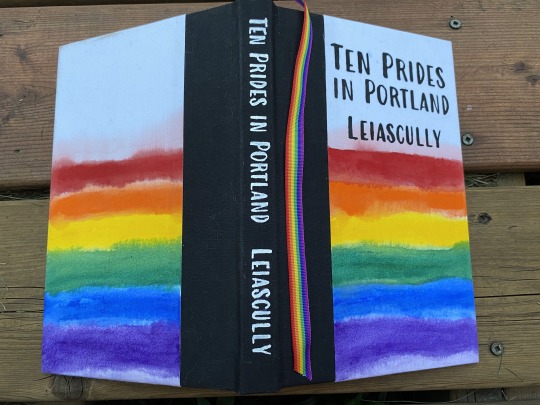


First off, Ten Prides in Portland! What it says on the tin. Ten years post-series at a certain brewpub in Portland, as Elliott finds queer community and figures himself out. This book is the reason I now have rainbow ribbon for bookmarks. As you can see, I went so very literal with this one. Homemade book cloth, acrylic paint, and cardstock endpapers printed with a map of Portland.
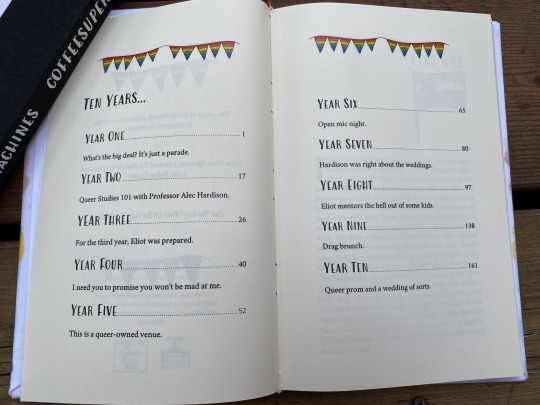
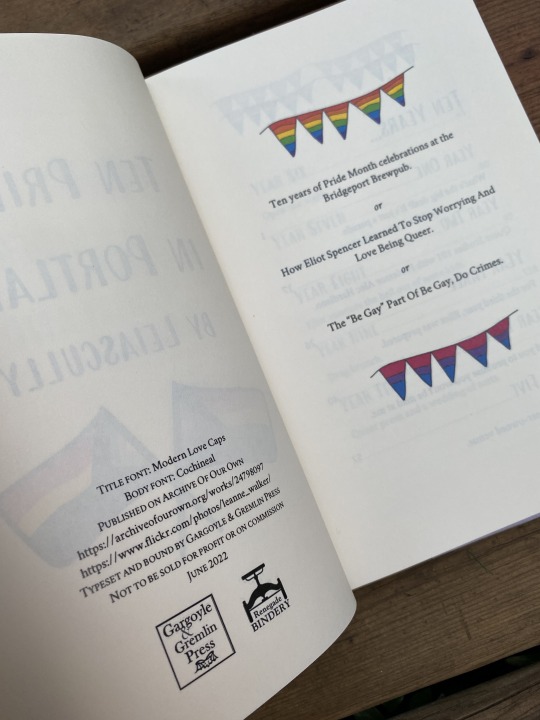
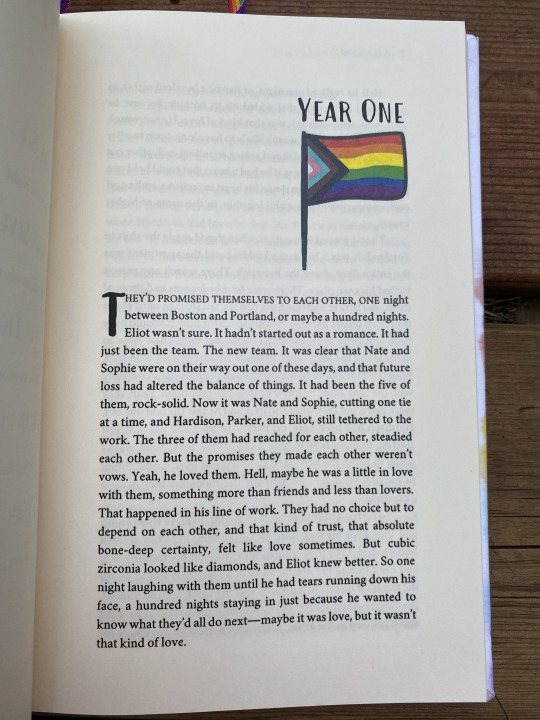
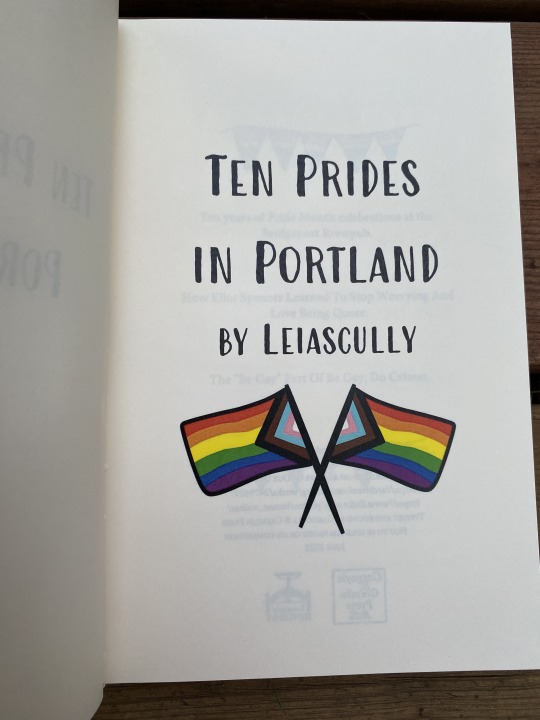

I had way too much fun with the layout on this one! It was an easy theme to lean into.
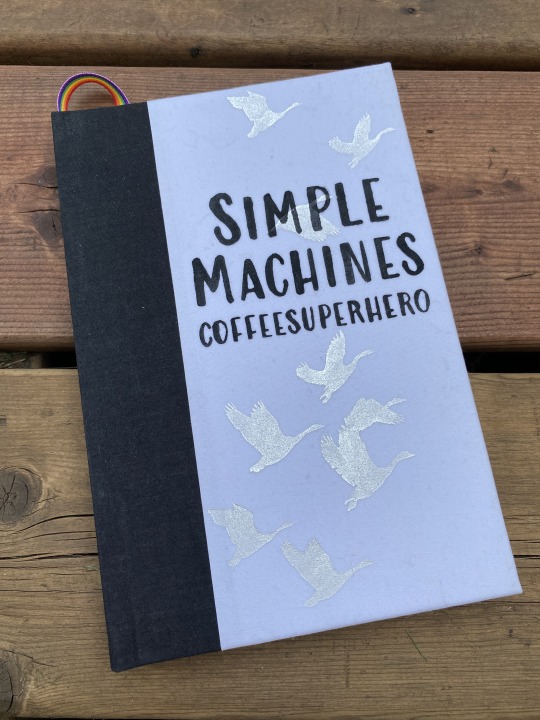

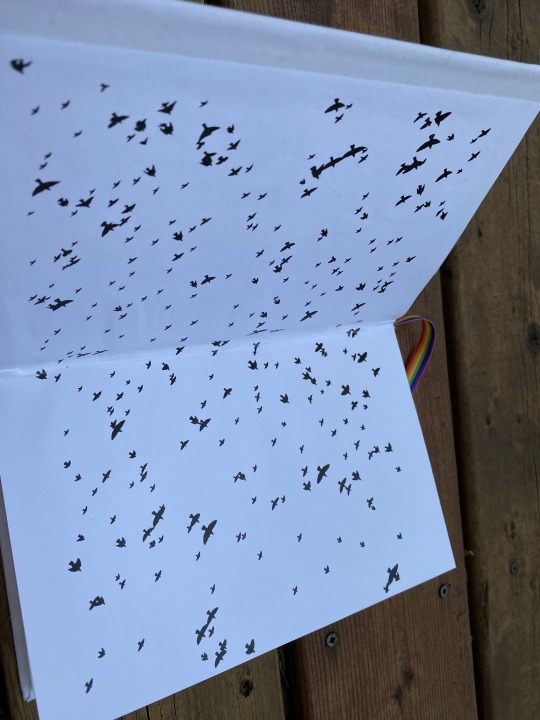

Eliot navigates a relationship with two people he loves, runs a restaurant, and figures himself out. I love the character dynamics, the cast of queer characters, and the way the second fic in the series is structured around brewpub menu items. The titles are from the iconic Mary Oliver poem Wild Geese, which is where the bird theme comes from. I used a really lovely fancy liquid mirror silver paint for the geese on the cover, which is gorgeous in person but hard to photograph.
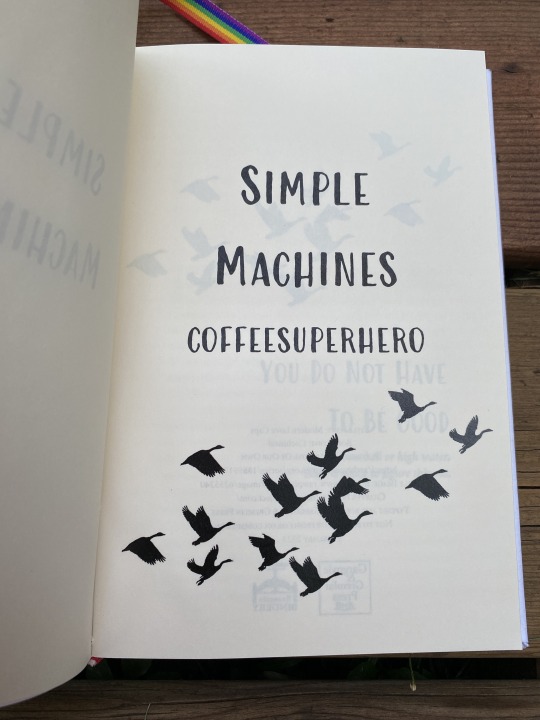

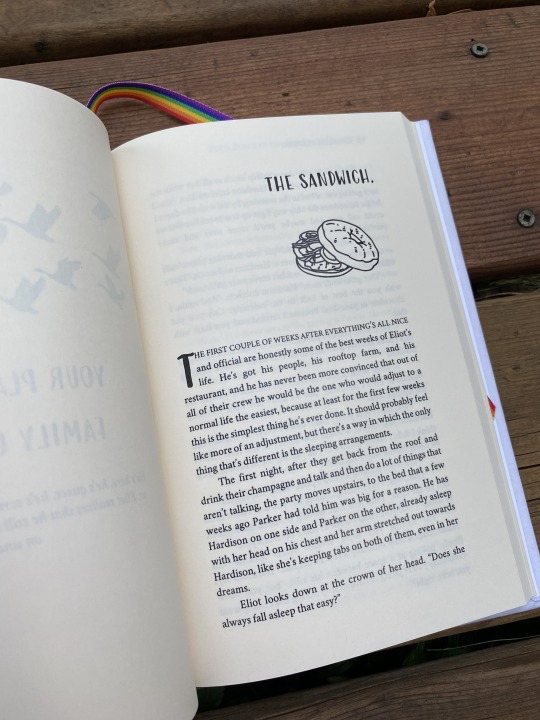
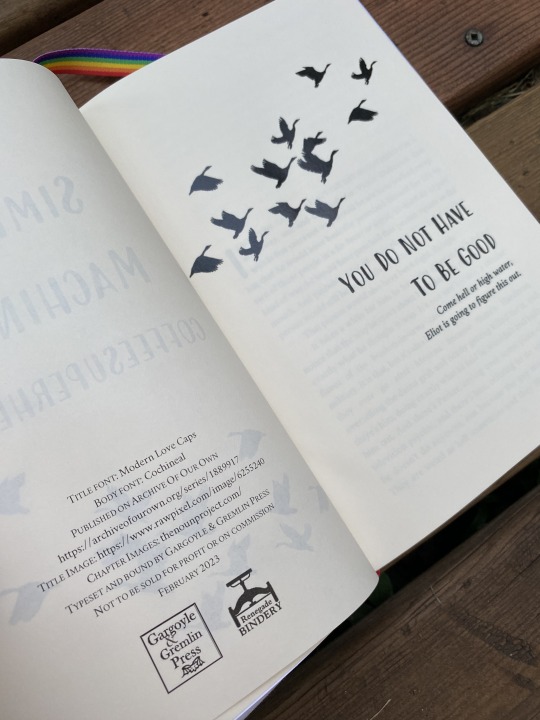

More geese! Some menu formatting! Also, a food-themed illustration at the beginning of each chapter to match the menu item. (Thank you, stock images on The Noun Project.) This was another fun one to play with.
Not pictured here for either book: the insurmountable printer issue I was having where any page with an illustration turned out extra-dark, and the flip side was correspondingly lighter. BUT. I'm still pretty pleased with how they both turned out, happy to have both of these on my shelf, and even happier to send them off in a set together to the authors' hands.
Happy slightly belated FFWAD, Leiascully and Coffeesuperhero!
#fanbinding#ficbinding#ffwad 2023#fanfic writers appreciation day#renegade loves fic#leverage fic#leverage ot3#eliot/parker/hardison#operation: give queer characters queer community#ten prides in portland#leiascully#simple machines series#coffeesuperhero#just another really elaborate fic rec
158 notes
·
View notes
Note
What’s a rad queer?
please excuse any spelling errors (we had wisdom teeth taken out and im a bit loopy, lol)
so this is a bit difficult for me to explain but if i had to put it simply, essentially radqueers are pro-mogai and radical inclusionists to the point of believing every aspect of identity can be a queer one. on paper, this sounds great! i love queer identities! but in practice, its a slippery slope, and results in... well, let me give some examples.
radqueers, by definition, also believe in a thing called "transx" or "transid", with the suffix "x" being replaced by... pretty much anything. the base idea, i believe, obviously takes from the trans experience-- whereas one might identify as cisgender or transgender, transid extends this to other aspects of the identity, such as being "cisautistic" (aka "born autistic") and "transautistic" (aka "transitioning into autism.")
this includes, but is not limited to (using their own terms) transage, transplural, transabused / transabuser, transharmful, transcharacter, transrace / trace, translanguage, and so on.
while some of these could make sense or encompass other experiences that arent necessarily harmful (such as transplural being, essentially, another word for created systems; or something like transage, where one 'identifies' as an age different from their body, which could theoretically account for a neurodivergent person's mental age discrepancy, such as being a minor alter in an adult body)... the vast majority of radqueer identities do not stop there, creating labels that arent helpful or actively encourage/foster harm -- such as "transabused" for instance, where one believes they should be, or wishes to be, abused in some way.
someone identifying as one of these labels, in our example "transabused", is often encouraged by the transx/radqueer community to "transition". this could look a number of ways, but in our example of "transabused" this could be something like looking for an abusive relationship on purpose or purposefully inducing trauma on onesself, or even lying to others that they were abused/exaggerating experiences in attempts to "transition" into being a victim.
it should be noted that certain transid labels have been "reclaimed" (i strongly dislike that word and its connotations, but its the best way i can describe it) and renamed by others, such as the transage label i mentioned previously also being known as "chronosian".
radqueers also encompass other things such as including paraphilias in the definition of "queer," which we believe to be not so much a queer identity as much as it is either a mental illness or a sexual deviance, in the most literal definition of "deviant" being "differing from the norm." this is a widely debated topic and its not our area of expertise, so i wont try to claim one thing or another--but regardless, while paraphilias can certainly influence a queer identity and they deserve spaces to express their experiences, it does not make one queer and they would be better suited for mental-illness-focused spaces.
that is where the "definition" aspect of this answer ends, so heres some personal anecdotes:
for us, we dont actually take issues with many "radqueer" identities (there is a time and place for things such as "transage" aka chronosian, or even "transplural" which is a stupid redundant word for created systems -- importantly, i do not believe these things are radqueer-exclusive) but its the reasons i mentioned above that we, and many others, do not agree with or support them. for instance lets look back at the "transabused" i mentioned before:
on the one hand, i wouldnt be against a kink relationship of this nature--if someone wants a cnc relationship, i wish them the best with that. on this blog, i believe we have spoken about being fully pro-bodily autonomy, even when it means the act of hurting onesself, such as self-harm or suicide. so that isnt necessarily what i find to be the core issue here.
i would, however, be against the labelling of it as "trans"-anything and claiming that a "trans" identity can go beyond the cultural definition of queerness. i would be against the idea that a "transabused" person should be allowed a voice when talking about issues affecting victims of violence, unless they had non-consensually experienced such violence. i would be against the idea that someone who is "transracial" (using the radqueer definition of "transitioning to a different race", because surprise, theyve stolen this term from adoptees of color) should be encouraged to transition to a different race they are not a part of, because race is a cultural identity and social construct with a loaded history, and not something that you can "transition" into having.
i support created systems, i support people using the split-attraction model, i support recovering paraphiles, i support mentally ill people and neurodivergent people and disabled people. i do not support the idea that something you can be born with or developed early in life, such as autism or ocd, can be purposefully transitioned into. i do not support co-opting mentally ill people's experiences for your own selfish gain, only to then turn around and call those same people "cis"-mentally ill.
i have a lot more to say about them than that, but ill try to keep this part brief. a while ago, our host was doing a write-up on the various pitfalls of transx identities, namely that most of them either arent queer identities inherently and are likely something else (i.e. transharmed, transracial) or if its a renaming of another experience that already exists (i.e. transplural, transage, translanguage). seemingly most radqueer identities are coopted from something else in a covert attempt to "tarnish" the validity of the original label, transracial and transage primarily being affected by that. but i wont go too deep into it.
anyway, were it not for all that, i would find this a really interesting conversation to have.
im highly intrigued by the people who have atypical dysphoria experiences, such as system members with different racial identities to their body's, or system members with differing mental illnesses, or how neurodivergent people feel as though their "true" age doesnt align with that of their body's, or therians and alterhumans discussing their experiences. i would even LOVE to use the term transplural if it werent for the connotations.
but like i said, its a slippery slope, and radqueers are more interested in harboring a harmful, "accepting" community than they are with actually deconstructing what it means to be queer or trans or plural or neurodiverse, etc. im sure scrolling through their tags for any number of seconds will show that, if youre curious, but i dont recommend it if you want to keep your sanity.
lastly, since i voiced my opinion here, i do want to also mention: i believe the way some antis talk about radqueers is reminiscent of the way they speak about other identities, such as endogenic and created systems or self-dx folks. the whole "you are hurting REAL queer people!!!" song-and-dance is so overplayed at this point. people like to point fingers with buzzwords instead of getting to the meat and potatoes, because that would be too complicated apparently.
you always hear "you cant be transautistic because youre a faker and hurting real autistic people!!" and almost never "you cant be transautistic because 'autism' is just a word for a group of symptoms that you do not truly display, and if you think you 'should be' autistic, you need to reexamine why that is," which is what i think would be more apt.
choosing to reiterate the same five sentences about being Wrong and Hurtful and Invalid over and over doesnt really explain anything and only continues infighting. also, it doesnt discourage radqueers from what theyre doing or from getting help and seeking a positive community, and instead it only helps to strengthen their cult-like ideas that anti-radqueers are bigots. (read more about that "cult" thing here. i dont fully agree with everything op says, but it was still enlightening to read from someone who survived an actual cult.)
i know its long, but i hope that helps somewhat. feel free to send more asks about this. like i said, i find it fascinating despite its problems.
💿 red
49 notes
·
View notes
Text
On Gallifreyan Vestigial Gender
[this is the revised and expanded version of some rambling i initially did in my cowriter's discord DMs. i tried cite sources where i could, but a lot of this has been marinating in my brain since half-absorbing posts twenty pages deep into peoples' dw tags 3 years ago, and also i spend way too much time on the wiki, so please excuse anything i can't quite source, which is most of it. huge thanks to @oriigami for being my original conversation partner and contributing extremely to the concepts here, and to @bird-of-paradox and @waywren, neither of whom I am being allowed to @, for bothering me into not leaving it as unreadable discord screenshots]
-
There's this tendency among queer Doctor Who fans to look at Time Lord society, with its alienness and regeneration, and ask, frustrated, "Why do they even have gender?"
I sympathize with this extremely. I've been the one asking this question plenty in the past, and I do think it's a bit silly, and even sillier that the genders are "man" and "woman" and there are apparently two of them. But I also think that the section of canon most insistent about the Gallifreyan gender binary, the 7th Doctor novels from the 90s, also has the potential to be the most interesting about it.
Now, this is not to say that the text of those novels isn't weird about gender in a flawed, written by (as far as I know) cis people in the 90s way. But I think that you can extrapolate and queer what's there in very interesting ways, often because it's so flawed in the first place: Gallifrey, too, is an extremely flawed society. Decadent, degenerate, and rotten to the core, as the show put it.
So, VNAs Gallifrey: living Houses and their female Housekeepers, cultural and literal planet-wide sterility, Loom birth, rigid overcomplicated bureaucracy, the enduring legacy of the pre-Rassilon Pythian regime. The gender binary as presented here goes something like
women: chaos/magic/psychic powers/superstition/the house (scary)/biological childbirth/fertility
men: cold rationality/order/science/bureaucracy/loom-birth/sterility
The Pythia and the Lord President. Magic and science. The House and the Web of Time.
Obviously a lot of this is classic gender binary stuff. But let's put the exasperated question of "Why must we do the gender binary like this?" aside for a moment and think about Gallifreyan society instead.
Pythia-ruled and Time Lord-ruled Gallifrey have a lot of the same problems in the end, just wearing different faces: they're both very much totalitarian states that believe themselves to be above everyone else. But while the Time Lords observe and micromanage the Web of Time from their Panopticon, maintaining its integrity to their standards, the Pythians didn't have time travel, so this preoccupation with control manifested--as far as I know; this is the bit in the meta where I admit I haven't actually read Time's Crucible yet--as keeping the entirety of society in one psychic hivemind, leaving nobody any privacy, plus a lot of future-reading and prophecy and whatnot.
The main relics of that societal layout into post-Rassilon Gallifreyan society are the Matrix, which has every single dead Time Lord's brain in it and does their prophecies for them, just couched in a little bit more science than Pythian magic, the Houses, which are alive all around you and in which you're constantly being watched by the Housekeeper through her mirrors, and, of course, the gender binary.
The Pythia was always a woman. Women were the ones with vast psychic powers, with magic; women were the ones in charge. Pythian Gallifrey was a heavily gendered society. This is because Gallifreyans are a kind of bug /shot with the "irrelevant to the point at hand" gun.
And so, when Rassilon rebelled, he was very much playing the part of "opposite gender with opposite worldview." The Pythia had female magic and superstition; he had male science and technology. His most trusted Founders were either all or mostly men, depending on the version of events you prefer. (Personally I have my doubts about the Other.) Rassilon built his new society as a man, among men, in opposition to the matriarchs before him.
Gallifrey, despite the invention (or theft, depending on the story) of regeneration allowing people to trans their gender randomly and sometimes unintentionally, never left the gender binary behind.
The whole point of modern Gallifreyan society is that they're still stuck in that exact same moment Rassilon took over (and the Pythia cursed them to sterility, if thats the version you're going with). You could easily make an argument for this being some cycle of abuse type situation; Rassilon and co overthrew the Pythia and immediately did exactly what she was doing to them to the wider universe. I tend to read it as a regeneration: it's the same society, really. It just died and was reborn, and now it looks and sounds different.
-
The downside of trying to translate a discord conversation into a proper meta post is that sometimes making a coherent transition between thoughts is impossible. So to introduce the next bit of this post, I'm going to hand you off for a moment to this post about the 8th Doctor's "I'm not sure I've ever even been a man" quote from Interference. As op of that post says, the Doctor is genderqueer even by Gallifreyan standards- he's being questioned in that scene by another Gallifreyan, who doesn't understand his experience of gender.
The EDAs are full of "Eight is nonbinary" quotes, of course. Every queer fan who's ever engaged with them has a collection (and if anyone knows where that one google doc compilation that was going around awhile back went I'd be in your debt, because I'd love to know if my collection is missing any), but almost all those quotes refer to his genderqueerness in human terms, as observed by human companions, or in response to human assumptions. Except that one. Not only is Gallifrey's gender binary alive and well in a society where people can literally change their gender when they die, but the Doctor doesn't fit inside it.
All this to say that being a renegade Time Lord is a nonbinary thing to do. Especially the Doctor, with all sorts of weird Other Timeless nonsense in their biodata. Women stay on Gallifrey (or Karn!) and do magic and watch you. Men stay on Gallifrey and do science and watch other people. Renegades go out and do whatever they please. But I'm getting ahead of myself.
-
So. Gallifrey has a gender binary. It's vestigial, a remnant of an earlier iteration of society with a much sharper male-female divide, and it doesn't make logical sense for it to exist. So: How does it manifest? And what function does its continued existence serve in the interests of the status quo and ruling class?
Let's take a look at 7th Doctor novel Lungbarrow.
Lungbarrow introduces us to (among many other things) the living Houses of the Time Lord Families, and to the family structures within: the patriarchal figure of the Kithriarch, the always-female Housekeeper, bound in her ritual marriage to the House itself, and hordes of petty squabbling Cousins.
Kithriarch is already an interesting title. It's obviously a gender neutral version of matriarch or patriarch, but the role itself seems to be almost entirely a male sort of thing in opposition to the feminine Housekeeper.
The Housekeeper, meanwhile, seems to be in a direct conceptual and societal line of descent from the Pythian priestesses: she can see anything within her domain, she has a psychic connection to the House, from whom she cannot hide anything, she can command the wooden Drudge servants and other House subsystems, she prioritizes the House above all where the Kithriarch is supposed to prioritize the Family. Women are frightening and powerful psychics. They know everything you want to keep secret, and prioritize the collective.
(There's also something here about how Lungbarrow presents duelling dualities--the Doctor and the Master, the CIA head and the Lord President, the Kithriarch and the Housekeeper, the masculine and the feminine--but I haven't quite tied it into the rest of this yet.) (Although while we're mentioning the Master. He's girlcoded by Gallifreyan standards and the Rani is boycoded by the same. I will not be expanding on this at this time just trust me.)
I think Housekeepers and women who want to be Housekeepers try to keep their self-image as women strong enough that they never regenerate into a male body (whatever a '"male body" means, of course, but I'm not sure Time Lords have gotten that far in their queer theory yet). I also think that there are more female Kithriarchs than male Housekeepers, because Housekeeper is much more heavily ritualized role in keeping with the Pythia's more ritualized general vibe, but I do think female Kithriarchs are still few and far between.
I also think that these are probably the most explicitly gendered occupations on Gallifrey, although of course you'll see some drift. Most women are out there getting the same scientific, military, and bureaucratic positions as men. But there's this lingering specter of gender roles, a Pythia-shaped hole that exists around the concept of womanhood. As my cowriter put it when we were talking about this, an "ideal of womanhood. not ‘ideal’ as in desirable, [but] ‘ideal’ as in the quintessential image of the thing."
This is further amplified by the continued existence of the Pythians in the form of the Sisterhood of Karn, living in their perfectly functional all-women magic society just out of sight. Their presence at the edge of the Gallifreyan consciousness must haunt the Time Lords, as any imperialist power is haunted by its own past and its own ultimate impotence.
Because that's the other thing. Gender roles are, to quote my cowriter again, "stupid and antiquated and historically potent tools of authoritarianism." Of course the Time Lords have them. Have you seen them?
They're tools of control, of conformity, of idealizing the past. Of conservatism. Consider, to once more quote my cowriter, "the weird traditionalist psychosis of having gender roles in a society that can’t bear children."
The ideal woman on Gallifrey is still the Pythia, millenia or even billenia on. And the ideal man is still the Lord President Rassilon.
-
[thank you for your time! if you liked this please consider checking out my fic Something Old, which is about lungbarrow, the adventuress of henrietta street, and the gallifreyan concept of marriage, and in the writing of which i initially articulated most of the thoughts in this post. i've previously characterized it as a fic that's actually a meta post. and please don't be too mean to me for anything i got wrong in here! i'm just a little guy]
#zephflix original#meta tag#doctor who#gallifrey#gender stuff#a house isnt a home without invasive psychic contact -gallifreyan proverb i just made up#also i bet the shobogans have great whatever the gallifreyan equivalent of gay bars are
64 notes
·
View notes